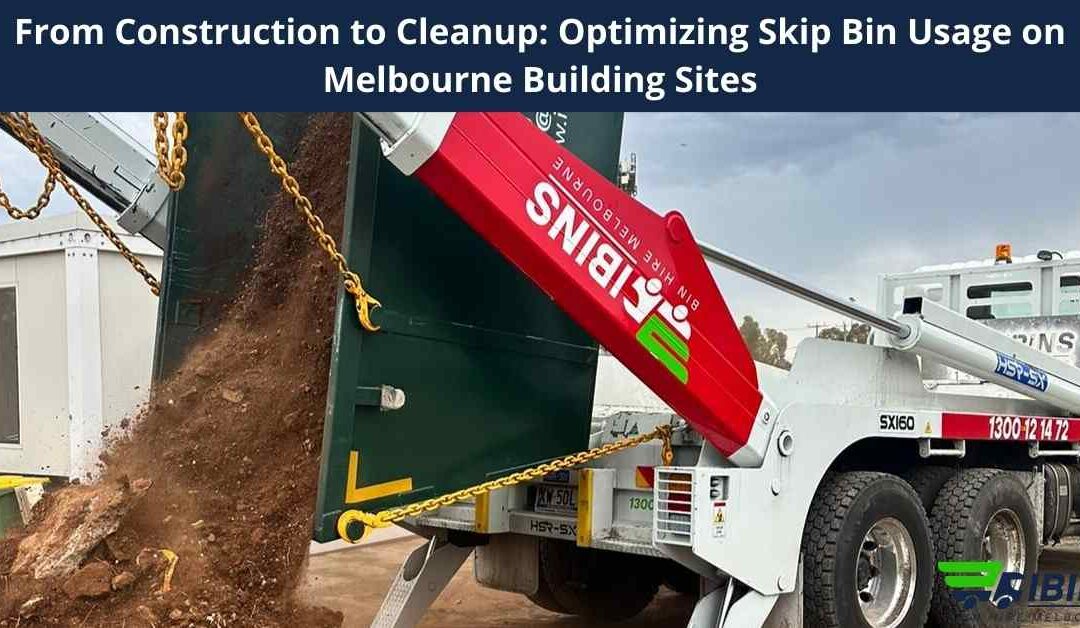In the bustling construction landscape of Melbourne, efficiency is paramount. Every aspect of the construction process, from material sourcing to waste management, plays a crucial role in project success. Among these, skip bins stand out as indispensable tools for maintaining a clean and organized site while ensuring environmentally responsible waste disposal. In this article, we’ll delve into the significance of skip bins on Melbourne building sites and explore strategies for optimizing their usage to streamline construction projects.
The Importance of Skip Bins in Construction
Skip bins serve as the cornerstone of waste management on construction sites. Whether it’s demolition debris, excess materials, or packaging waste, these bins provide a centralized solution for collecting and containing various types of construction-related waste. By having designated areas for waste disposal, skip bins contribute to site safety, minimizing clutter and reducing the risk of accidents or injuries.
Moreover, skip bins facilitate compliance with regulatory requirements governing waste disposal in Melbourne. By partnering with reputable skip bin hire companies, construction firms can ensure that waste is disposed of in accordance with local regulations and environmental standards, avoiding potential penalties and liabilities.
Optimizing Skip Bin Usage
To maximize the benefits of skip bins on Melbourne building sites, construction professionals can implement several strategies aimed at optimizing their usage:
- Tailored Bin Sizes: One size doesn’t fit all when it comes to skip bins. Depending on the scale and nature of the construction project, selecting the appropriate bin sizes is crucial. Assessing the volume and type of waste generated allows for the optimal allocation of skip bins. By choosing the right sizes, construction teams can avoid overfilling bins or wasting space, thus optimizing efficiency and cost-effectiveness.
- Strategic Placement: Strategic placement of skip bins can significantly impact workflow efficiency on construction sites. Positioning bins in convenient locations, such as near high-traffic areas or areas prone to waste accumulation, minimizes the time and effort required for waste disposal. Additionally, placing bins away from sensitive areas, such as pedestrian walkways or machinery zones, enhances safety and accessibility.
- Segregation and Recycling: Effective waste segregation is key to maximizing the recycling potential of construction waste. Skip bins can be designated for specific types of materials, such as wood, metal, concrete, or general waste, facilitating sorting and recycling efforts. Partnering with skip bin hire companies that offer recycling services ensures that recyclable materials are diverted from landfills, contributing to sustainability goals and reducing environmental impact.
- Regular Monitoring and Maintenance: Regular monitoring and maintenance of skip bins are essential to ensure continuous functionality throughout the construction project. Construction teams should schedule routine inspections to assess bin capacities, address any damage or wear, and arrange for timely emptying or replacement as needed. By staying proactive in maintenance efforts, construction firms can avoid disruptions caused by overflowing bins or equipment malfunctions.
- Communication and Training: Effective communication and training play a crucial role in optimizing skip bin usage among construction personnel. Educating workers on proper waste disposal procedures, including segregation guidelines and safety protocols, fosters a culture of accountability and compliance. Additionally, establishing clear communication channels with skip bin suppliers allows for seamless coordination of bin deliveries, pickups, and any specific requirements or modifications.
Benefits of Optimized Skip Bin Usage
By implementing the aforementioned strategies for optimizing skip bin usage, construction firms in Melbourne can reap a multitude of benefits, including:
- Enhanced Efficiency: Streamlined waste management processes contribute to improved workflow efficiency, saving time and resources.
- Cost Savings: Optimal bin sizing, recycling efforts, and maintenance practices help minimize waste-related expenses and reduce overall project costs.
- Regulatory Compliance: Adhering to waste disposal regulations and environmental standards mitigates the risk of fines or legal liabilities.
- Environmental Sustainability: Maximizing recycling and minimizing landfill waste aligns with sustainability objectives, reducing the project’s carbon footprint.
- Improved Site Safety: Well-placed and properly maintained skip bins contribute to a safer working environment by minimizing hazards and clutter.
In the dynamic construction industry of Melbourne, efficient waste management is paramount for project success. Skip bins play a pivotal role in maintaining cleanliness, safety, and regulatory compliance on building sites. By implementing strategies for optimizing skip bin usage, construction firms can enhance efficiency, reduce costs, and contribute to environmental sustainability. Through tailored bin sizing, strategic placement, waste segregation, regular maintenance, and effective communication, Melbourne builders can leverage skip bins as indispensable tools for streamlined construction operations.
If you are in Williamstown, Victoria 3016, and looking for a skip bin hire service, this is the best way to visit us
IBINS Pty Ltd
83 Forsyth Rd, Hoppers Crossing VIC 3029

